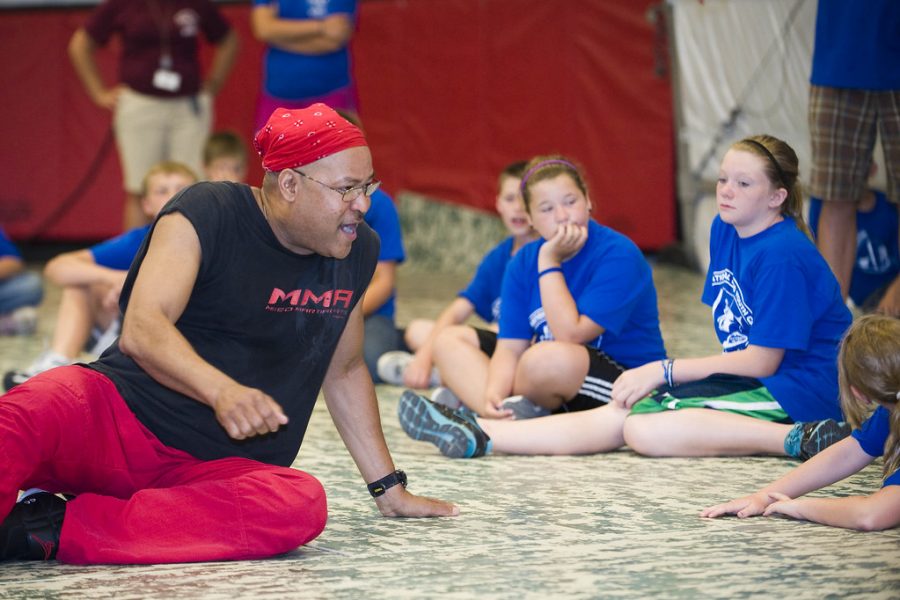Cushman: Kids Can Learn Self Defense Too
120th Public Affairs Detachment
“120619-Z-MG757-014” by Camp Atterbury – Muscatatuck Public Affairs is licensed under CC BY-ND 2.0
August 12, 2021
Every parent wants their child to grow up happy, healthy and successful. They often put their kids in sports or extracurriculars to help them experience various activities and develop skills. For me, that meant dance, soccer, swim and piano lessons with the occasional art class thrown in. My parents never asked me if I wanted to learn self-defense the way they asked if I wanted to learn piano.
While I imagine lots of kids grow up with routines like mine, parents should consider integrating self-defense training into their kids’ schedules. Along with learning physical defense skills, self-defense classes teach confidence, bodily autonomy and consent. As options for teaching kids self-defense become more diverse and available, we need to normalize teaching self-defense to children so they can protect themselves throughout their life.
Physical Defense
At eight years old, I believed that my parents loved cheering me on at my soccer games because of the sport. But since then, my mom has explained to me that they signed me up not because she loved soccer or even because I loved it, but because she wanted me to learn certain skills. This sentiment makes sense. Playing sports teaches kids to work in a team, gives them a new environment to socialize in, helps them maintain a healthy weight and teaches them how to lose.
Simply put, sports make kids healthier. Self-defense can do all those things, too. It keeps kids active, gives them an outlet for their energy and teaches them important skills — and it also teaches kids how to stay safe.
Growing up, I learned how to protect myself from online predators and was told not to talk to strangers, but I never learned to protect myself from someone actively trying to hurt me. We live in a scary world. Teaching kids self-defense has the benefits of other sports, but it could also save lives in bullying or kidnapping situations.
Confidence
While not a lot of research specifically studies teaching children self-defense, evidence suggests that teaching kids martial arts increases their confidence. Sparring can help kids learn to act in stressful situations. Hitting pads helps them understand and control their own strength. A supportive group environment provides kids with peers who they feel safe around. All of that builds confidence and most self-defense courses include these attributes.
In my own experience, taking a self-defense course as an adult made me feel powerful. My whole class cheered me on and I walked out the door feeling ready for whatever life might throw at me.
Predators specifically seek out kids with low self-esteem. When we build our kids up, we also protect them from insecurity and those who prey on that vulnerability. Everyone deserves to feel confident, but confidence also makes kids harder to manipulate and groom. Parents should take every opportunity they can to help their kids build that confidence — and self-defense classes are a great option.
Modeling Consent
Studies have shown that even college-age students struggle to understand consent, which demonstrates a need for more education about consent and coercion. However, in Utah, we do not teach consent in our classrooms, and efforts to change that have received a lot of pushback.
Some parents feel uncomfortable teaching their children about consenting to sex. Regardless, our kids deserve to know that they can set boundaries and have them respected. Self-defense classes create a space where consent can be modeled in an entirely non-sexual way.
A lot of self-defense has roots within sports like wrestling, jiu-jitsu and other forms of martial arts. All of those sports share one thing: a way to tap out.
To tap out means stop, and no matter when someone taps out, it is respected. When someone taps out, no one pressures them to keep training. The action of tapping out models consent because, like consent, someone can say stop at any point and it means just that — stop.
By teaching kids they can tap out and set a boundary at any point while training, we teach kids that they have control over their own body. We get them comfortable setting boundaries about their body. When kids learn about bodily autonomy at a young age, even in nonsexual settings, they know that they do not have to be touched when they do not want it. It also opens the door to talk about consent when kids are old enough because they already understand that “no means no.”
Self-defense does not just stop child victimization by teaching kids how to physically stop violence, but also because it teaches them confidence, bodily autonomy and consent. Those are skills that kids can carry with them their entire lives. After taking a self-defense class as an adult, I can say that I wish I’d had that opportunity when I was young. I wish someone had told me that I had control over my body and what happens to it. With so many more self-defense options for kids now, it’s time for parents to use them.








